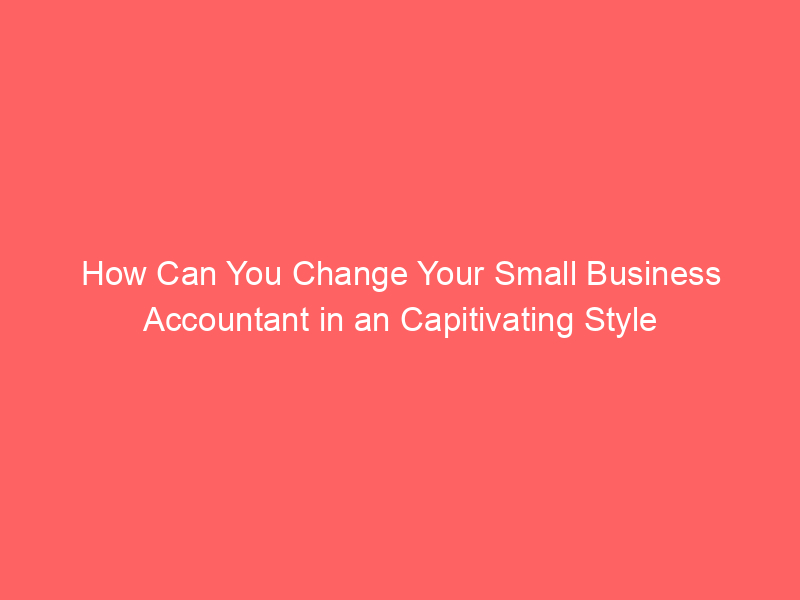Most small business don’t have the time or money to have a full-time in-house accountant. Instead, they often outsource this work to an independent contractor
1. Why You Should Consider a Change
If you’re a small business owner, you know that having a reliable and trustworthy accountant is essential to your success. But what happens when you feel like your current accountant isn’t meeting your needs? Maybe they’re not providing the level of service you need, or maybe you’re just not happy with the way they do things. Whatever the reason, if you’re considering a change, there are a few things you should keep in mind. First, it’s important to understand that changing accountants is not a decision to be made lightly. After all, your accountant is responsible for your financial wellbeing, so you need to be sure that you’re making the right decision. That said, there are a few things you should consider before making a change. First, take a look at your current situation and ask yourself if you’re really unhappy with your accountant. If you are, then it’s probably time for a change. However, if you’re just not thrilled with the level of service you’re receiving, you may want to try talking to your accountant first. They may be able to make some changes that will make you happier. Second, consider your options. If you’re not happy with your current accountant, you have a few different options. You can find a new accountant, you can switch to a different accounting firm, or you can do your own accounting. Each option has its own set of pros and cons, so you’ll need to weigh them carefully before making a decision. Third, make sure you’re making the right decision for your business. Changing accountants is a big decision, and it should be made with the best interests of your business in mind. Be sure to consider all of your options and make the decision that’s right for you and your business. Making the decision to change accountants is a big one, but it doesn’t have to be a difficult one. Just be sure to carefully consider your options and make the best decision for your business.
2. How to Find the Right Accountant for Your Business
When it comes to finding the right accountant for your business, it’s important to do your homework and ask around for referrals. Once you’ve found a few potential candidates, be sure to interview them to get a feel for their qualifications and personality. Once you’ve found the right accountant for your business, it’s important to establish a good working relationship. This means being communicative and keeping them up to date on your business’s financial situation. If you’re not happy with your current accountant, don’t be afraid to make a change. After all, it’s your business and you should have the final say on who handles your finances.
3. Making the Switch: What to Expect
You have decided to switch your small business accountant and want to do it in an interesting and engaging way. Here are some tips on how you can make the switch in a style that will be sure to capture your audience’s attention. 1. Plan ahead – give yourself and your team enough time to research and find the right accountant for your business. This way you can avoid any last minute rushing and make sure you are making the best decision for your company. 2. Be clear on what you want – take some time to sit down and think about exactly what it is you are looking for in an accountant. This will help you to narrow down your search and find someone who is a perfect fit for your business. 3. Make a list of questions – once you have found a few potential candidates, make a list of questions that you would like to ask them. This will help you to compare and contrast the different options and make sure you are making the best decision for your business. 4. Take your time – don’t feel like you have to make a decision right away. This is a big decision for your business and you want to be sure you are making the right choice. 5. Get input from your team – involve your team in the decision making process. They will be the ones working with the accountant on a day-to-day basis so it is important to get their input and feedback. Making the switch to a new accountant can be a big decision for your small business. But with a little bit of planning and preparation, you can make the switch in an interesting and engaging way.
4. The Benefits of a Good Accountant
If you are a small business owner, you may be wondering if it is time to change your accountant. Perhaps you are not happy with the level of service you are receiving, or you are not sure if they are providing you with the best advice. Here are four benefits of a good accountant that may make you want to switch to a new one: 1. A good accountant can save you money. If you are not happy with the fees you are currently paying, or you feel like your accountant is not providing value for money, it may be time to switch. A good accountant will be able to save you money by ensuring that your tax bill is as low as possible and by providing advice on how to maximise your profits. 2. A good accountant can help you grow your business. If you are looking to grow your business, a good accountant can be a valuable asset. They will be able to provide advice on how to expand your business in a tax-efficient way and can help you to access funding to support your growth. 3. A good accountant can make your life easier. If you feel like your current accountant is not meeting your needs, it may be time to switch to someone who can make your life easier. A good accountant will be proactive in providing advice and support, and will be available when you need them. 4. A good accountant can provide peace of mind. If you are worried about your finances or you are not sure if you are making the most of your money, a good accountant can provide peace of mind. They will be able to advise you on financial planning and can help you to make the most of your money.
5. How to Get the Most Out of Your Accountant
If you’re unhappy with your current accountant, it may be time for a change. Here are a few tips on how to make the switch in an engaging way: 1. Do your research Before making any decisions, it’s important to do your research and find an accountant that’s a good fit for your business. Ask around for recommendations, read online reviews, and compare pricing and services. 2. Schedule a consultation Once you’ve found a few potential candidates, schedule a consultation to get to know them better and discuss your specific needs. This is also a good opportunity to ask questions and get a feel for their personality and communication style. 3. Make the switch Once you’ve decided on an accountant, it’s time to make the switch. Start by transferring your financial records and setting up a meeting to go over your new accountant’s process and procedures. 4. Communicate regularly To get the most out of your relationship with your new accountant, be sure to communicate regularly. This means asking questions, providing feedback, and keeping them up to date on changes in your business. 5. Review your progress After working with your new accountant for a period of time, take a step back and review your progress. Are you happy with the results? Are they meeting your needs? If not, don’t be afraid to make changes or switch accountants again.
6. Making Your Small Business Run More Efficiently
Assuming you want tips on how to change your small business accountant: 1. Do your research: before making any decisions, it’s important to do your research and figure out exactly what you need and want from an accountant. This will help you narrow down your choices and make the decision-making process easier. 2. Ask for recommendations: reach out to your network of family, friends, and business associates and see if they have any recommendations for accounting firms or individual accountants. 3. Consider your budget: be sure to consider your budget when making your decision. You don’t want to overspend on accounting services, but you also don’t want to skimp and end up with subpar service. 4. Compare services: once you’ve narrowed down your choices, take the time to compare the services each accountant or firm offers. This will help you make sure you’re getting the best possible value for your money. 5. Schedule a consultation: most accountants offer free consultations, so take advantage of this and meet with a few of your top choices. This will give you a chance to get to know them and their work style and see if they’re a good fit for your business. 6. Make your decision: after doing all of your research and comparing your options, it’s time to make a decision and choose the accountant or firm that’s right for you.
7. Tips for Hiring a Contract Accountant
There are a lot of small businesses that don’t have in-house accounting departments. This can be for a variety of reasons, but usually it’s because the business is too small to justify the cost of hiring a full-time accountant. If you’re in this situation, then you’ll need to hire a contract accountant to do your accounting for you. Here are some tips for hiring a contract accountant: 1. Make sure they’re qualified The first and most important thing to check is that the contract accountant you’re considering is qualified. They should be a Chartered Accountant (CA) or a Certified Public Accountant (CPA). 2. Check their references Once you’ve confirmed that the contract accountant is qualified, you should check their references. Ask for references from previous clients and make sure to follow up with them. 3. Get a fixed price quote When you’re hiring a contract accountant, make sure to get a fixed price quote. This will ensure that you know exactly how much you’ll be paying and there won’t be any surprises. 4. Make sure they’re insured It’s important to make sure that the contract accountant you’re hiring is insured. This will protect you in case anything goes wrong. 5. Ask about their availability When you’re hiring a contract accountant, you need to make sure that they’re available when you need them. Ask about their availability and make sure that it aligns with your needs. 6. Get a contract When you’re hiring a contract accountant, make sure to get a contract in place. This will protect both you and the accountant. 7. Ask about their experience When you’re hiring a contract accountant, make sure to ask about their experience. You want to make sure that they have experience with the type of accounting you need. Hiring a contract accountant can be a great way to outsource your accounting needs. Just make sure to follow these tips and you’ll be sure to find a great accountant that meets your needs.
8. How to Train Your New Accountant
If you’re thinking about changing your small business accountant, there are a few things you can do to make the transition as smooth as possible. Here are a few tips on how to change your small business accountant in an capitivating style: 1. Make a list of the qualities you’re looking for in a new accountant. 2. Do your research and ask for recommendations from trusted sources. 3. Interview a few potential candidates. 4. Choose the accountant that you feel is the best fit for your business. 5. Train your new accountant on your business’s accounting system. 6. Keep communication open with your new accountant. 7. Be patient as your new accountant gets up to speed on your business. 8
9. The Do’s and Don’ts of Firing Your Old Accountant
When most small business owners hear the word “accountant†they think of someone who is going to do their taxes. However, an accountant can do much more than just prepare your taxes. They can also help you with financial planning, budgeting, and even bookkeeping. If you are not happy with your current accountant, there are a few things you should do before firing them. First, you should sit down with your accountant and explain your concerns. If they are unable to address your concerns, then it may be time to find a new one. Second, you should make sure that you have all of your financial documents in order. This includes your tax returns, financial statements, and any other pertinent information. This will make the transition to a new accountant much easier. Finally, when you are ready to fire your old accountant, you should do so in a professional manner. This means sending a certified letter that states your intention to terminate the relationship. Be sure to include a specific reason for your decision. Once you have taken these steps, you will be well on your way to finding a new accountant who can better meet your needs.
10. How to Avoid Common Accountant Mistakes
1. Do your research: when looking for a new accountant, be sure to check out their credentials and experience. Ask for referrals from other business owners, and look for online reviews. 2. Make sure they’re a good fit: once you’ve narrowed down your choices, set up a meeting with each potential accountant. Be sure to ask about their experience with businesses like yours, and see if they’re a good fit personality-wise. 3. Get everything in writing: before making your final decision, be sure to get everything in writing. This includes their fees, what services they’ll be providing, and when they’ll be available. 4. Stay organized: once you’ve made your decision and are working with your new accountant, be sure to stay organized. This means keeping track of all your financial documents, and being prompt with any questions or concerns you have. 5. Communicate regularly: in order for your accountant to best help you, be sure to communicate with them on a regular basis. This way, they can stay up-to-date on your business’s financial situation and offer advice when needed.
You may be thinking about changing your small business accountant for a variety of reasons. Maybe your current accountant isn’t meeting your needs or maybe you’re simply ready for a change. Whatever the reason, there’s no need to be nervous about changing accountant. With a little planning and some research, you can find an accountant that’s a perfect fit for your small business.







